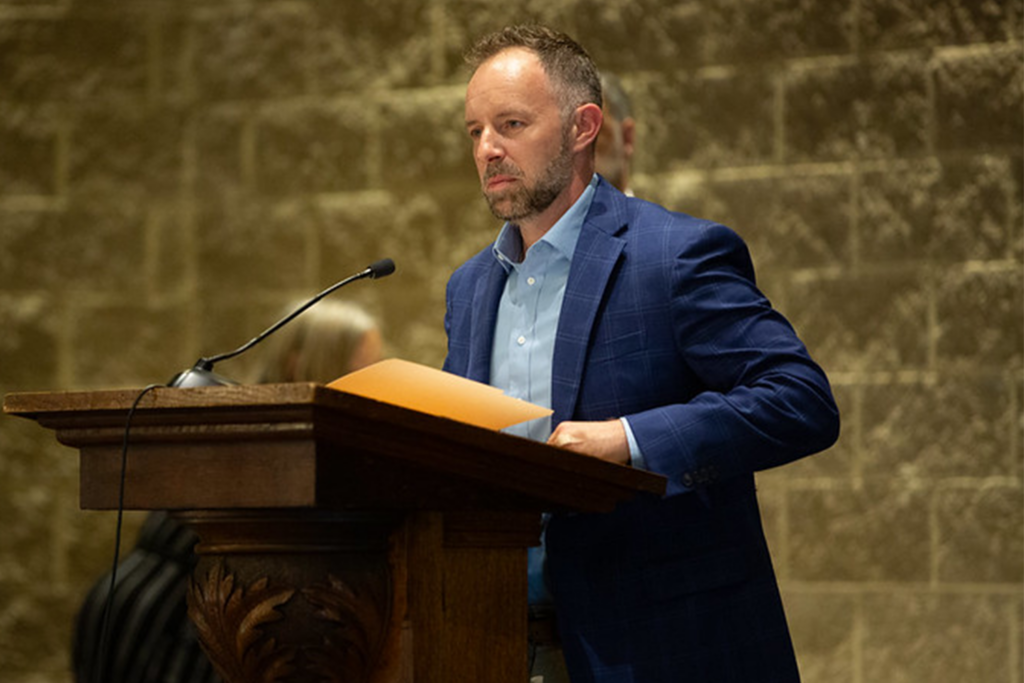A decade ago, the University of Tennessee College of Law offered just two elective courses in health law and had no full-time health law faculty.

Associate Professor Zack Buck, a specialist in health law and policy, bioethics, and tort law, first came to the College of Law in August of 2016. He sought to improve and expand on the course offerings, with the goal of creating a full-fledged health law program.
Positioned for growth
It’s a goal worthy of investment, he says, considering that the health care industry has a significant presence in Tennessee.
“Three of the largest health care systems in the U.S. are based in the Nashville metro area,” Buck says, also pointing out that some 500 health care companies are headquartered there. “A third of all income in Middle Tennessee comes from health care.”
Consequently, there is an increasing demand for health law specialists in the region.
“As the state’s flagship university, we are in an incredibly unique position to grow in this space,” he says.
Improving curricula
To that end, Buck has spent much of the past decade talking with students, faculty, alums, and various stakeholders about what is most needed in a health law program.
In addition to reorganizing the content of the original two electives, Buck created three more courses that address a number of other important health law issues. The College of Law now offers five stand-alone courses in health law:
- Health Law Finance & Organization
- Health Law Regulation & Quality
- Health Care Fraud and Abuse
- Bioethics & Public Health Law
- Global Public Health Law
“I built all of the electives to stand alone, and none have prerequisites, so you can drop in without any experience in health law,” he says. “Part of what I’ve been doing is expanding and evolving our health care law offerings, but maintaining flexibility so students who come in with certain professional interests can explore those in a way that’s best for them.”
Over the years, Buck has pointed interested law students toward the Health Policy Graduate Certificate, a program available through the College of Nursing. A self-professed “product of cross-disciplinary education,” Buck has built relationships with other departments and colleges on campus as well. He has taught a course, for example, at the Haslam College of Business and has worked with UT’s Department of Public Health on curricular development.
Preparing for practice
There are also a growing number of hands-on opportunities for health law students as well. Past externships and field placements—with organizations such as the East Tennessee Children’s Hospital, the office of the Tennessee Attorney General and the U.S. Centers for Disease Control and Prevention—as well as the College of Law’s Nashville Semester in Residence Program have provided students with valuable field experience.
With the knowledge and skills gained through coursework and experience, students are receiving excellent preparation to enter the field of health law.
“The health law courses offered at the UT College of Law have allowed me to engage with material I am certain to encounter in practice and have further proved my passion for pursuing a career in this field,” says Virginia Pirkle, a class of 2025 J.D. candidate. “Through courses such as Health Law Finance & Organization, Health Law Regulation & Quality, and Bioethics, I have gained a skill set that I can confidently say has prepared me for my future career as a health law attorney.”
Mitchell Gladstein (UT Law ’23), an associate with Holland & Knight, credits Buck’s health law curricula for straightening his own path into the profession. “Health law is a notoriously complex area of practice, and the program’s courses provided me with what has proven to be an incredibly strong foundation in this field,” he says. “Without the program’s courses and, specifically, Professor Buck’s teaching, it would have been much more difficult for me to hit the ground running when I first began practicing as a health care regulatory attorney in September of 2023.”
Gaining momentum
As graduates are making positive impressions in the field, others are recognizing the College of Law for the quality of its health law offerings.
For multiple years, Buck has taken groups of students to Chicago to participate in the annual National Health Law Transactional Competition, hosted at Loyola University. In 2021, a team of UT Law students finished second overall.
Then U.S. News & World Report, in its list of Best Health Care Law Programs of 2024, ranked the College of Law 21st among public institutions and 47th nationwide—the latter rank being 14 points above the College’s previous position in the Health Care Law category.

And the college recently hired another health law specialist, Valarie Blake, who is leaving West Virginia University to join the UT College of Law faculty this fall—further evidence that the College is achieving goals that Buck envisioned back in 2016.
“Health Law is an area with a lot of momentum,” he says. “A lot of people think of law school as dusty and staid, but health law is not that at all. We’ve been intentional about how we can grow and change with the field. When I look at trend lines, I see that we’re improving, and people are noticing us.”
